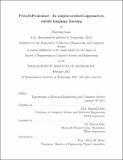PressToPronounce : an output-oriented approach to mobile language learning
Author(s)
Liao, Kaiying
DownloadFull printable version (671.0Kb)
Alternative title
Output-oriented approach to mobile language learning
Other Contributors
Massachusetts Institute of Technology. Department of Electrical Engineering and Computer Science.
Advisor
Randall Davis and Darren Edge.
Terms of use
Metadata
Show full item recordAbstract
Learning a second language has become popular not only for people who wish to communicate with those who do not speak their native language, but also for professionals who are required to speak to colleagues around the globe. Unfortunately, learning a language requires time and practice that is difficult to fit into many people's daily schedules. Currently, mobile applications are available to help language learners study "on-the-go;" however, most mobile-based exercises focus on learning to understand input, specifically on memorizing vocabulary, and fail to support users in developing their output skills, such as writing and speaking. In this thesis, I describe the design and implementation for PressToPronounce, a mobile application that helps native Mandarin Chinese speakers practice English speaking skills. Ideas from second language acquisition studies and persuasive technology strategies guided the design of short, focused, user-centered exercises to help learners develop their competency of the target language and improve their performance through practicing pronunciation. The application also takes advantage of Computer-Assisted Pronunciation Training (CAPT), a state-of-the-art pronunciation analysis tool that provides quantitative speech and pronunciation feedback to support users in tracking their progress. Preliminary user tests for the system showed that users were enthusiastic about output-oriented exercises, and given the opportunity, would continue to use the application to practice their speech.
Description
Thesis: M. Eng., Massachusetts Institute of Technology, Department of Electrical Engineering and Computer Science, 2015. This electronic version was submitted by the student author. The certified thesis is available in the Institute Archives and Special Collections. Cataloged from student-submitted PDF version of thesis. Includes bibliographical references (pages 55-56).
Date issued
2015Department
Massachusetts Institute of Technology. Department of Electrical Engineering and Computer SciencePublisher
Massachusetts Institute of Technology
Keywords
Electrical Engineering and Computer Science.